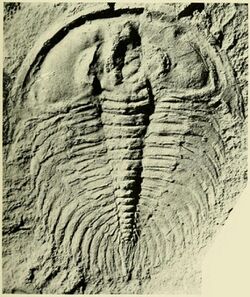Biology:Callavia
| Callavia | |
|---|---|

| |
| Callavia | |
| Scientific classification | |
| Kingdom: | |
| Phylum: | |
| Class: | |
| Order: | |
| Suborder: | |
| Superfamily: | |
| Genus: | Callavia Matthew, 1897
|
| Species: | C. broegeri
|
| Binomial name | |
| Callavia broegeri (Walcott, 1890)
| |
| Synonyms | |
| |
Callavia is an extinct, monotypic genus of trilobite arthropods. C. broegeri lived during the late Atdabanian stage, which lasted from 530 to 524 million years ago during the early part of the Cambrian Period[3] in what are today Canada and the United States.
Taxonomy
The position of Callavia in relation to other Olenellina has shifted repeatedly over time. Initially it was assigned to the Holmiinae by Pierre Hupé, and was later moved back and forth to the Callaviinae.[4] Lieberman, however, argues Callavia is a basal member of the Judomioidea.[2]
Reassigned species
- C. brevioculata = Nevadella cartlandi
- C. burri = Pleisionevadella burri
- C. callavei = Callavalonia callavei
- C. cartlandi = Nevadella cartlandi
- C. cobboldi = Nevadella cartlandi
- C. eucharis = Nevadella eucharis
- C. hastata = Callavalonia callavei
- C. lotzei = Sdzuyomia lotzei
- C. perfecta = Nevadella perfecta
Distribution
C. broegeri is known from the Lower Cambrian of Newfoundland (Brigus Formation, Branchian Series, Conception Bay), Nova Scotia (between Docters Brook and Malignant Brook, northernmost Antigonish Highlands), Canada, and Massachusetts, USA (Weymouth Formation, Pearl street, North Weymouth, Mill Cove, Norfolk County).
Ecology
C. broegeri occurs together with lampshells Sunnaginia imbricata and Eccentrotheca kanesia, and the agnostid Serrodiscus bellimarginatus.[5][6]
See also
References
- ↑ Lieberman, B.S. (1998). "Cladistic Analysis of the Early Cambrian Olenelloid Trilobites". Journal of Paleontology 72 (1): 59–78. doi:10.1017/S0022336000024021. Bibcode: 1998JPal...72...59L. http://invitestock.free.fr/Cambrien/pdf/Spanish%20fauna/Cladistic%20Analysis%20of%20the%20Early%20Cambrian%20Olenelloid%20Trilobites.pdf.[yes|permanent dead link|dead link}}]
- ↑ 2.0 2.1 Lieberman, B.S. (2001). "Phylogenetic analysis of the Olenellina Walcott, 1890 (Trilobita, Cambrian)". Journal of Paleontology 75 (1): 96–115. doi:10.1666/0022-3360(2001)075<0096:PAOTOW>2.0.CO;2. http://www.bioone.org/doi/full/10.1666/0022-3360%282001%29075%3C0096%APAOTOW%3E2.0.CO%3B2.
- ↑ Sepkoski, Jack (2002). "A compendium of fossil marine animal genera (Trilobita entry)". Bulletins of American Paleontology 363: 1–560. Archived from the original on 2006-09-05. https://web.archive.org/web/20060905162524/http://strata.ummp.lsa.umich.edu/jack/showgenera.php?taxon=307&rank=class. Retrieved 2008-01-12.
- ↑ Palmer, A.R.; Repina, L.N. (1993), "Through a Glass Darkly: Taxonomy, Phylogeny and Biostratigraphy of the Olenellina", The University of Kansas Paleontological Contributions 3: 1–35, http://kuscholarworks.ku.edu/dspace/handle/1808/3760
- ↑ Landing, E. (1995). "Upper Placentian-Branchian series of mainland Nova Scotia (middle-upper Lower Cambrian) faunas, paleoenvironments, and stratigraphic revision". Journal of Paleontology 69 (3): 475–495. doi:10.1017/S0022336000034879. Bibcode: 1995JPal...69..475L.
- ↑ Paleobiology Database
Wikidata ☰ Q26183 entry
 |

